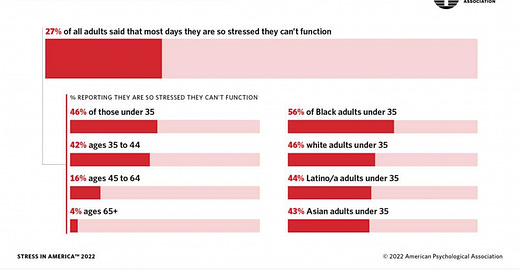A Three Step Stress Solution
If you read my Substack, it’s probably because you lead a busy life that often feels overwhelming to navigate. Likely you’ve noticed that this has an impact on your relationships. If that’s you, you’re not alone. 12,000+ other people read this Substack too and I work with many couples in my therapy office exploring the role of stress on their most important relationships.
In 2022, the American Psychological Association (APA) did a survey that found that Americans have a “battered psyche” from the onslaught of stress that they are facing - both “normal” daily stressors on top of “an intense range of stressors over the past few years, as the COVID-19 pandemic, racial injustice, and political divisiveness have dominated news cycles and social media.”
All of these things (the stressors on the “outside of our relationships”) spillover into the connection we have with others. Our levels of stress play a role in the stability of our relationships. Of course, this makes sense. When we are depleted we are less likely to respond to other people with kindness, affection, humor, curiosity, flexibility, and many of the other qualities we need to exhibit in order to have a strong relationship.
The impact of stress on relationships has been studied for a long time. We know that it impacts people’s minds, bodies, and emotions in a way that makes it harder to have the bandwidth to relate. Yet, many of us don’t know where to start to fix it all.
Yesterday, I was asked by someone on my Instagram account about handling the stress spillover. The asked “Any tips on how to get out of that stress spillover situation? We’re living that right now.”
This is a complex question and answering it fully would require me to write a book (good thing I did - available for preorder here). However, in this newsletter, I want to share with you my Stress Spillover System. This can help you and your partner start the conversation begin to focus on what you can change and start to cope with what you can’t.
The Stress Spillover System
To start utilizing my system for overcoming stress spillover in your life, start by writing down all of the stressors you can think of in your relationship. You and your partner can work together to make a “master list” or work separately and then combine your lists once you’re both finished.
This list should include everything that is stressing you out. It doesn’t need to be perfect, but push yourself to think of the big and small stressors in your lives.
Once you’ve created a list, pick a time to meet with each other to begin to split your stressors into three “baskets”:
Basket 1: Shedding
Look at your list and put anything you can “shed” into this basket. Items that we can shed tend to be things we are doing that we don’t really need to be doing. For example, if we feel like our lives are imploding, maybe we don’t actually need to volunteer to bring all of the snacks to the Girl Scout meeting each week. What tends to go into the shedding category are tasks that you can outsource (yes, this can be expensive and might not be possible or worth it for everything) or obligations you’ve taken on that you can’t actually agree to anymore (driving someone somewhere, doing extra projects at work not related to your pay or job description, etc).
Once you put everything that you can shed into this basket, go over your list again. Is there anything else you could push yourself to shed?
Basket 2: Preventing
After adding stressors to your shedding basket, go through your list and see which stressors could be prevented with better systems - routines, rituals, and structure. These stressors tend to be issues you can predict but because life feels chaotic and unstructured you end up not using your future-seeing abilities to prevent the problems.
Don’t get overwhelmed - you don’t need to make up rituals, routines, and structures right now …just add what you think needs to be prevented to this basket. That is your first step.
Basket 3: Adapting
Some stressors in our lives can’t be shed and they can’t be prevented. People get sick, lives get busy, random awful-ness happens. In these situations, we need to work on learning to adapt to the circumstance. Adapting requires us to build stress management skills - like knowing how to let our stress cycle complete, be good co-regulators, and accepting our reality (even when it’s hard).
Now that you’ve looked at what you can shed and prevent, put any stressors you need to adapt to into your adapting basket.
As you work on these three baskets together, be curious with each other and open to change. Once you’ve filled your three baskets, the next task is to start small - thinking about one small thing you could shed ASAP and one small thing you could work to prevent ASAP. Then, committing to learning how to self and co-regulate together to adapt to anything else.
Things won’t change over night, but making your stressors visible and beginning to think through them in terms of shedding, preventing, adapting can help you start the journey towards a less stressful life.
If you enjoy my work, it would mean the world to me if you’d preorder Til Stress Do Us Part. Preorders are really important in terms of getting the book into the hands of people who I’m not already connected with! The preorder numbers determine if books make it into bookshops, on reading lists, and more.
Here are some places you can preorder:
Thank you for your support!







